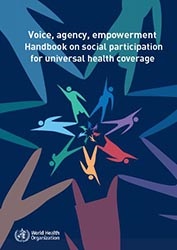
Social participation mechanisms are vital for responsive health reforms that leave no one behind in efforts to achieve universal health coverage (UHC). In September 2019, Member States at the UN High Level Meeting on UHC made a commitment to engage relevant stakeholders, including civil society, through establishing participatory and transparent multi-stakeholder processes for influencing policies and reviews of progress on UHC.
WHO’s support to Member States thus promotes a concept of UHC which includes the need to foster multi-stakeholder policy dialogue on issues linked to UHC reform. Setting up, fine-tuning, improving, and institutionalizing new or existing participatory health governance mechanisms to involve the population, communities, and civil society requires a specific skill set in which governments need to invest.
In response to requests from Member States and the recommendations of the Taskforce on WHO-CSO engagement, WHO, UHC2030, the Governance Collaborative, and the UHC Partnership recently released a handbook. This guidance document was jointly developed with civil society actors, Member State representatives, and academia through the Social Participation Technical Network.
The Handbook on Social Participation for UHC provides specific best practice guidance to policy-makers on how to meaningfully engage with the population, communities, and civil society for policy- and decision-making.
Voice, agency, empowerment - handbook on social participation for universal health coverage
The handbook was launched on 31 May 2021. The link to the session recording can be accessed here
Advisory bodies supporting handbook development
The Social Participation Technical Network (SPTN) was convened in February 2019 as a joint venture between WHO, the Health Systems Governance Collective and UHC2030 to guide the development of the handbook. It is comprised of representatives of member states (1/3 of members), civil society (1/3), international organizations and academia (1/3). Its role has been to discuss and agree the core content of the book, review different draft versions of chapters, and advise on dissemination and implementation. In addition, a WHO internal advisory group on community participation was convened for an additional steer to the handbook. This group is comprised of specialists from WHO’s vertical programme departments whose work focuses on community engagement and mobilization.
